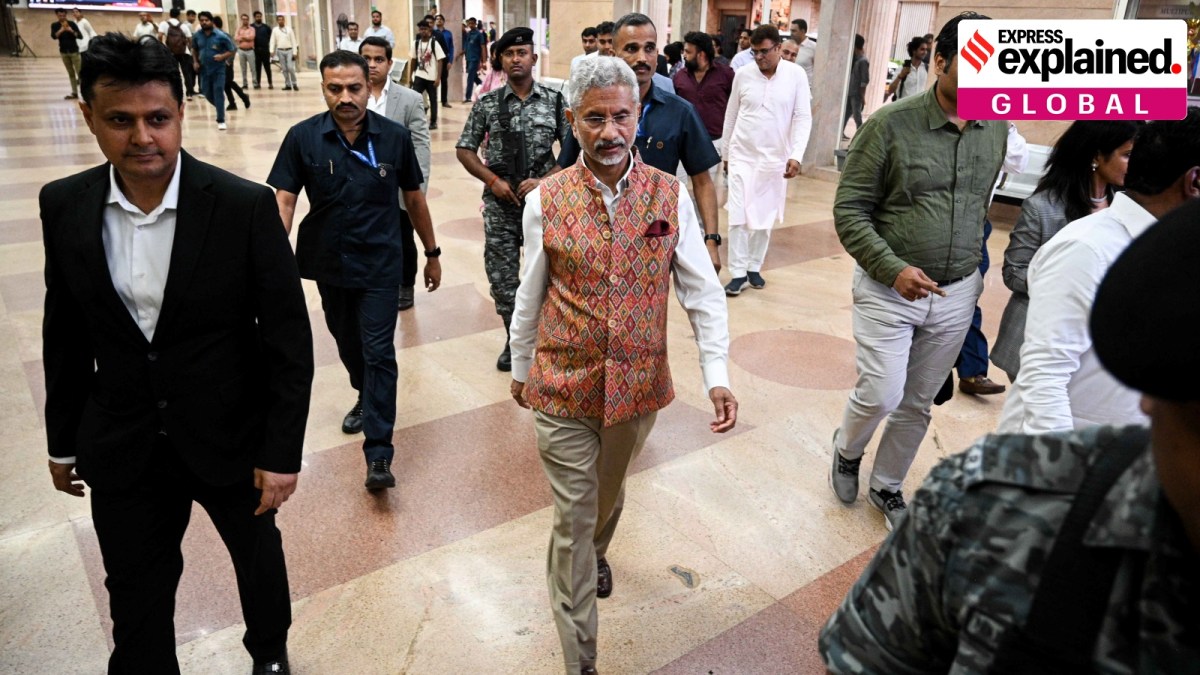Jaishankar to visit Pakistan for SCO meeting: What is the organisation — and what is its significance?
SCO is one of the few international organisations which deal with security issues and primarily has Asian members. What was the context for India and Pakistan becoming its members? We explain.

External Affairs Minister S Jaishankar will travel to Islamabad, Pakistan, to attend the Shanghai Cooperation Organisation (SCO) ‘Heads of Government’ (HoG) meeting on October 15-16. Pakistan had invited Indian and Prime Minister Narendra Modi to the meeting in August this year.
What is the SCO and why is the grouping important for India? We explain.
What is the Shanghai Cooperation Organisation?
Its origins lie in the “Shanghai Five”, formed in 1996 and consisting of China, Russia, Kazakhstan, Kyrgyzstan and Tajikistan.
With the dissolution of the USSR in 1991 into 15 independent countries, there were concerns in the region about extremist religious groups and ethnic tensions coming to the fore. To manage these issues, a grouping was created for cooperation on security matters.
Building on this, SCO was established on June 15, 2001, in Shanghai as an international organisation, and also included Uzbekistan as a sixth member. Before the inclusion of Belarus, it had nine members: India, Iran, Kazakhstan, China, Kyrgyzstan, Pakistan, Russia, Tajikistan, and Uzbekistan.
Afghanistan and Mongolia hold Observer Status.
Why is the SCO significant?
SCO is one of the few international organisations which deal with security issues and primarily has Asian members. Regional heavyweights Russia and China have stressed its position as an alternative to a “Western” international order. Along with the BRICS grouping, which has India, South Africa and Brazil as well, the two countries are seen positioning against US influence.
But despite declarations of a “limitless friendship” between China and Russia in recent years, there is also a sense of competition between them over who wields greater influence at such forums.
While the Central Asian republics have traditionally been viewed as part of Russia’s backyard or sphere of influence, China has also sought to leverage the oil and gas-rich nations through investments in massive infrastructure projects in the region. This has happened alongside China’s rising economic strength in recent years, with the projects also part of its larger Belt and Road Initiative (BRI).
The inclusion of India and Pakistan in SCO in 2017 was also seen as reflecting this jostling. While Russia supported India’s entry as a longstanding strategic partner, China backed its ally Pakistan to prevent the balance of powers from tilting in Russia’s favour.
SCO’s larger expansion of late also has to be seen in the context of the United States’ deteriorating ties with Russia and China. Events such as the 2022 Russia-Ukraine War and trade tensions with China that began under US President Donald Trump have further given them impetus to include more countries in their grouping.
Chinese state media outlet Global Times said in 2023, that Iran’s inclusion was seen as a step for further enhancing “the international status and influence of the organisation, and for Iran, it is an important step in breaking the US diplomatic blockade”.
However, there may not be many tangible outcomes from the SCO. An article in the Financial Times noted: “The opaque parameters it uses to launch its initiatives and institutions allows countries to look past the rivalries they have with others in the group. But it does nothing to heal the rifts. Thus the SCO embraces both Pakistan and India, which acknowledge their mutually hostile ties. India’s relationship with China itself is also tense on several fronts.”
It quotes Yun Sun, director of the China Program at the think-tank Stimson Center, as saying, “The vague language of most of the initiatives made it easy for countries to pay lip service to them. China could then point to this rhetorical support as evidence that a large number of countries backed its world view… However, these countries would only be willing to accommodate China’s demands up to a certain point. When push came to shove, they would follow their own interests.”
What relevance does the SCO hold for India?
On one level, SCO membership allows India to participate in a forum which enhances its scope of cooperation with Central Asian countries, which have not had particularly close relations with India since their formation in 1991. It also matters for maintaining communication with major actors in the region on common security issues.
For example, an important permanent structure within the SCO is the Regional Anti-Terrorist Structure (RATS). It assists members in the preparation and staging of counter-terrorism exercises, analyses key intelligence information coming in from the member states, and shares information on terrorist movements and drug trafficking.
However, the relevance of the organisation comes into question given the difficulty in managing ties among the partners. As the FT article notes, India shares tense relationships with China and Pakistan at present. Last year, when the summit was to be held under India’s presidency as part of the rotation, it decided to hold a virtual summit instead.